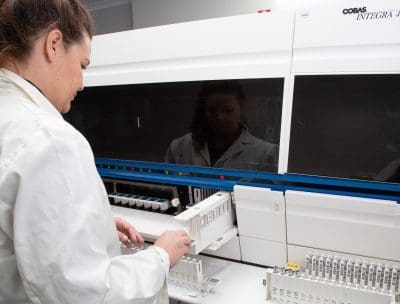Regulatory approval has been received for the local production of a unique vaccine to improve the health of feedlot cattle.
Apiam Animal Health’s ACE Laboratories has received approval from the Australian Pesticides and Veterinary Medicines Authority to manufacture a Histophilus somni vaccine for cattle, sheep and goats.

Apiam acquired ACE Laboratories in 2019 with an aim to develop and manufacture new vaccines, filling gaps in the market to improve the health of cattle and other farm animals.
“This unique custom vaccine is a first for the Australian livestock industry and will assist vets and livestock producers to prevent disease caused by this misunderstood pathogen, which can cause high levels of mortality and morbidity in intensively raised cattle,” the company said.
Apiam’s managing director, veterinarian Dr Chris Richards, said it had been one of his company’s key business goals to develop unique vaccine solutions for the beef and dairy industries where commercial vaccines don’t currently exist or are starting to fail, and as demand for alternatives to traditional antibiotic use continue to grow.
Feedlot vet Dr Tony Batterham has seen the effects of the Histophilus somni pathogen first-hand. Despite being a common bacterium that lives in the nasal cavity of cattle, some mechanisms of why it suddenly becomes an aggressive pathogen causing disease and death remain unknown.
The bacteria invade blood vessels and organs causing local vascular damage and interruption of blood supply when translocated to other sites in the animal’s body. Animals can also get blood infections, and when the spinal cord and brain are affected, a neurological condition called thromboembolic meningoencephalitis (TEME) can occur.
Histophilus can also infect heart muscle causing acute myocarditis and heart failure, in addition to spreading to the joints resulting in joint infections.
“I’ve seen a few cases where this bacterium suddenly flares up, usually when other bacteria and viruses are involved. It can mark the fact that a high level of respiratory disease is present in the feedlot, in common with Mannhemia or Pasturella bronchopneumonia complex, resulting in high morbidity and in some cases death of the animal,” Dr Batterham said.
From these initial respiratory infections, Histophilus can transport itself to multiple other locations and cause further disease.
“Stresses are known to trigger the disease which occurs most often in calves or young animals recently introduced into feedlots,” Dr Batterham said.
“Antibiotics are currently used to treat affected animals, but with this new vaccine opportunity, we see a real opportunity to be able to reduce their use and improve antimicrobial stewardship programs, which is a key focus for our company.”
As a veterinarian consulting to some of Australia’s largest feedlots, Dr Batterham was keen to point out that although Histophilus is not the primary cause of disease to the Australian feedlot industry, the pathogen can cause significant losses to the industry under the right circumstances.
“I see this vaccine being used in combination with existing vaccines. ACE Laboratories has also recently developed a pasturella vaccine which we have been using on several feedlots. These results have been extremely promising to date and by being able to have a single vaccine against both pathogens will provide the industry with a new unique solution to address these two emerging pathogens.”
Dr Richards said since the acquisition of ACE Laboratories, Apiam had now brought to market three new vaccines for cattle.
“We have also introduced new technologies in the development of these vaccines, which will now be applied across our entire vaccine portfolio. In a step change for industry, we expect that this will result in even higher vaccine efficacy delivering better animal health outcomes,” he said.
“Being able to develop and manufacture these technologies locally at our Bendigo facility is what makes custom vaccines so valuable to our domestic livestock industries – especially when we are seeing antigenic drift on Australian farms as well as lack of effectiveness of some imported commercial vaccines.”
